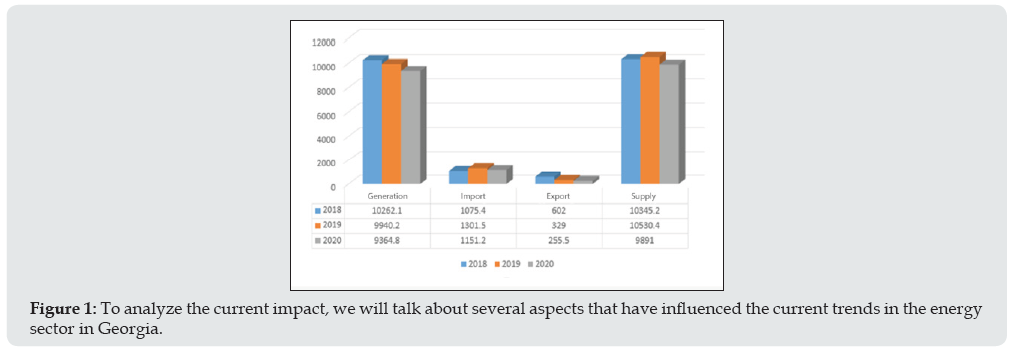
Lupine Publishers Group
Lupine Publishers
Menu
Review ArticleOpen Access 
Impact of Covid 19 on the energy Sector in Georgia Volume 1 - Issue 4
Maia Melikidze1* and Otar Nadiradze2
- 1Associate professor at BTU, Founder of RES LAB Renewable Energy Sources Laboratory, Georgia
- 2Researcher at RES LAB, Business and Technology University, Georgia
Received: November 23, 2021 Published: December 13, 2021
Corresponding author: Maia Melikidze, Associate professor at BTU, Founder of RES LAB Renewable Energy Sources Laboratory, Georgia
DOI: 10.32474/JBRS.2021.01.000117
Abstract
This paper analyzes specifically how the supply and consumption of electricity in the energy sector of Georgia has changed from 2018 to the present. As you know, with the growth of the population, the demand for energy system is also increasing. The need to generate energy balance is related to such important issues of global policy as climate change and energy security.
Decrease in demand-supply was identified, following are its main reasons:
a) Generation decreased
b) Office workload reduced in lockdown conditions
c) Limits introduced under the subsidy program of the government reduced electricity and gas consumption by the population in order them to meet the limit and taxes to be played by the state
d) Solvency decreased that also impacted electricity consumption
Introduction
Water and water-related resources are in the first place among the natural resources of Georgia. The country is one of the first in the world in terms of hydropower potential (rivers, lakes, reservoirs, glaciers, groundwater, swamps). According to historical sources, the first supporter of the use of electric lights in Tbilisi was a wellknown public (Figure 1). Niko Nikoladze. Electricity generation in Georgia began in 1887, when thermal engines were installed in the city of Tbilisi to illuminate the Georgian Drama Theater. The works were carried out by the Swedish company “Blanche”. The initiator and inspirer of this work was the Georgian writer and public (Figure 2). Ilia Chavchavadze. The great shortage of electricity in Georgia, the growing demand for electricity allowed Georgian scientists and engineers, together with foreign specialists, to design and build such a unique hydropower plant as the Enguri HPP, which was ran into exploitation in 1978.
Figure 1: To analyze the current impact, we will talk about several aspects that have influenced the current trends in the energy sector in Georgia.

Figure 2: Reduction of electricity demand after implementing lockdown measures in selected regions, weather corrected.

Main part
After conducting research in various directions, as well as analyzing statistical information, based on data received from the Ministry of Economy and Sustainable Development of Georgia, GNERC and the Bureau of National Statistics of Georgia, it was determined that Over the years, the energy balance has been compiled based on the recommendations of the International Energy Agency (IEA) and Eurostat and fully complies with international standards. Based on the available data, it can be said that in the first 10 months of 2020, (Tables 1-3). The total generation, as well as domestic supply and imports decreased (Figure 3).
Global Situation
First of all, it is interesting to look at the problem from a global perspective: if we look at global trends in the development of the energy sector, the results are deplorable:
a) Both demand and supply decreased
b) Many companies stopped operating and went bankrupt
c) The price of shares of companies on the stock exchange fell to a minimum
All of this obviously had its underlying causes. Economic experts say the economic crisis caused by the pandemic could have a far greater impact on countries than the 2008 economic crisis. This is clearly due to global lockdowns and restrictions, in particular the fact that:
a. Most people have moved home, lost their job or are working remotely
b. Generation suspended - Part of generation stopped during the lockdown process, which also had a negative impact on demand-supply.
c. The flights were suspended, which obviously had a huge impact on the global energy sector.
d. In addition, the income of individuals has decreased, which has a negative impact on their solvency.
Impact on Georgia
It is interesting that Georgia’s energy sector is following the global trend, however, it is not as a huge change as it is in bigger countries.
Clearly the same reasons for the decline in demand-supply have had an impact on the global market, although it is interesting to note that the results are not so different from the 2018 and 2019 data. It is interesting why? Let’s start with the fact that Georgia is very different from the big countries in terms of GDP sectors: in particular, the level of industry is much lower. We can see this clearly in the charts below. (Tables 1&2).
Results
All this is reflected in the fact that, first of all, the suspension of production will not have a large impact on demand-supply, at least the impact will be lower than in other countries where production is above 25%. However, it should also be noted that production in the lockdown process in Georgia has not stopped, neither construction has stopped, and the work of large sectors has continued. Consequently, there was a small change, but it was not as big as globally.
a) The general economic situation of the country, in particular the fact that the level of unemployment and poverty in Georgia is already high, leads to the fact that the impact of the economic crisis on the country is lower than on rich countries. Consequently, the impact of the general global trend on the energy sector was quite small, in principle, the energy consumed by people working in the service did not change during the pandemic.
b) Subsidizing limits: It is also interesting to note that the state has subsidized energy bills, which may lead us to think that consumption would increase, although we must keep in mind that subsidies apply to small consumption, which forces more people to get within that limit in order to receive subsidies from the state. Those who may have consumed more energy, reduce consumption, this is obviously impacted by declining incomes, rising unemployment, and also the fact that during lockdown many offices, service providers, hotels stopped working, which in general image reduced consumption and supply.
c) Suspension of Flights: Flights in the country were suspended since March, which also had an impact on the general trend of reducing electricity consumption. However, even here it is important to note that it did not have as a huge impact as in airtransit countries. Since Georgia does not have a large capacity in terms of flights, and it does not have its own large aviation, hence the impact is not very large. Lockdown also did not affect transit traffic, which reduced overall impact [1-3].
Conclusion
In summary, we can conclude that Georgia has followed the global trend, both production and demand-supply have decreased. However, at the end this change was just minimal. Covid-19’s influence in Georgia was not as great as it was globally. Which, to some extent, we owe to a weak economy. Even a small share of production means that reduced production does not have a vital impact on reducing energy consumption. During an economic crisis, in the case of a generally weaker economy, the impact is also relatively small, compared to countries with stronger economy. However, in terms of further development, it would be recommended that the state to take care of alternative energy generation sources, which would increase the generation of domestic energy, and make the country less dependent on imports, which would obviously pose much less risk during crises.
References

Top Editors
-

Mark E Smith
Bio chemistry
University of Texas Medical Branch, USA -

Lawrence A Presley
Department of Criminal Justice
Liberty University, USA -

Thomas W Miller
Department of Psychiatry
University of Kentucky, USA -

Gjumrakch Aliev
Department of Medicine
Gally International Biomedical Research & Consulting LLC, USA -

Christopher Bryant
Department of Urbanisation and Agricultural
Montreal university, USA -

Robert William Frare
Oral & Maxillofacial Pathology
New York University, USA -

Rudolph Modesto Navari
Gastroenterology and Hepatology
University of Alabama, UK -

Andrew Hague
Department of Medicine
Universities of Bradford, UK -

George Gregory Buttigieg
Maltese College of Obstetrics and Gynaecology, Europe -

Chen-Hsiung Yeh
Oncology
Circulogene Theranostics, England -
.png)
Emilio Bucio-Carrillo
Radiation Chemistry
National University of Mexico, USA -
.jpg)
Casey J Grenier
Analytical Chemistry
Wentworth Institute of Technology, USA -
Hany Atalah
Minimally Invasive Surgery
Mercer University school of Medicine, USA -

Abu-Hussein Muhamad
Pediatric Dentistry
University of Athens , Greece

The annual scholar awards from Lupine Publishers honor a selected number Read More...







